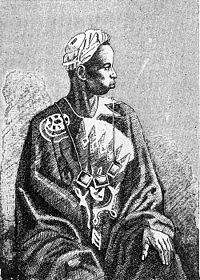Griot
This article's lead section may be too short to adequately summarize the key points. (March 2019) |

A griot (/ˈɡriːoʊ/; French: [ɡʁi.o]; Manding: jali or jeli (in N'Ko: ߖߋߟߌ,[1] djeli or djéli in French spelling); Serer: kevel or kewel / okawul;[2][3] Wolof: gewel) is a West African historian, storyteller, praise singer, poet, or musician. The griot is a repository of oral tradition and is often seen as a leader due to their position as an advisor to royal personages. As a result of the former of these two functions, they are sometimes called a bard.
Role of griots[]
Griots today live in many parts of West Africa and are present among the Mande peoples (Mandinka or Malinké, Bambara, etc.), Fulɓe (Fula), Hausa, Songhai, Tukulóor, Wolof, Serer,[2][3] Mossi, Dagomba, Mauritanian Arabs[citation needed], and many other smaller groups. The word may derive from the French transliteration "guiriot" of the Portuguese word "criado", or the masculine singular term for "servant." Griots are more predominant in the northern portions of West Africa.[4]
In African languages, griots are referred to by a number of names: jeli in northern Mande areas, jali in southern Mande areas, guewel in Wolof, kevel or kewel or okawul in Serer,[2][3] gawlo
